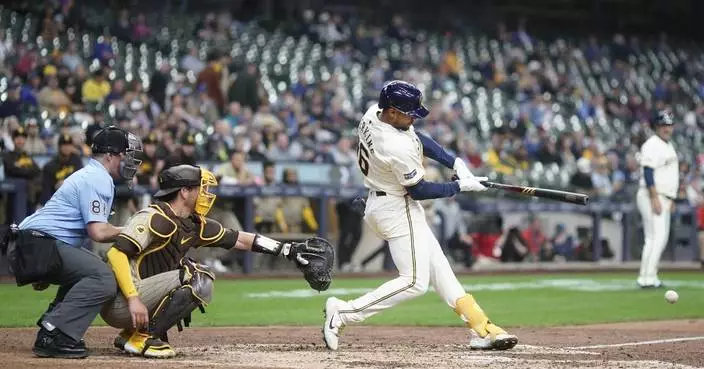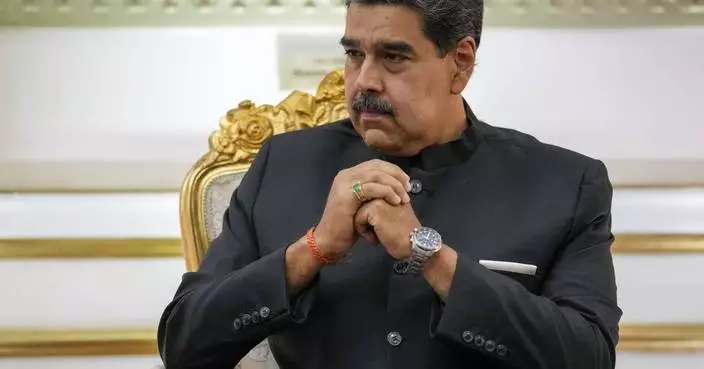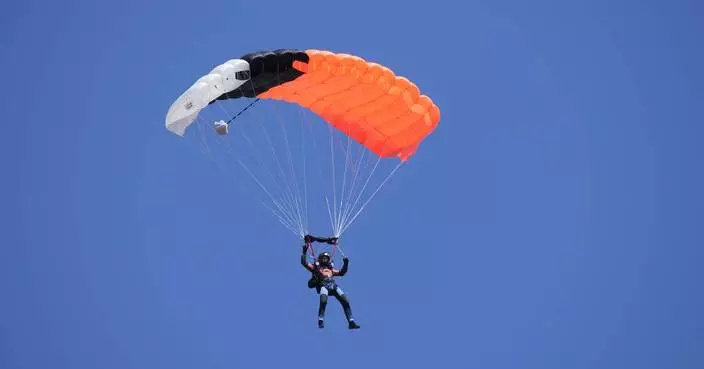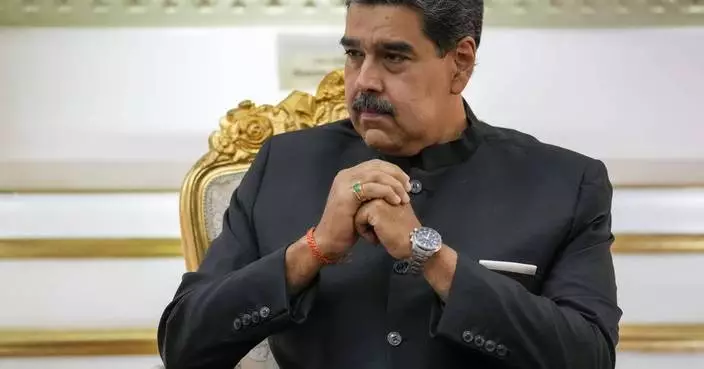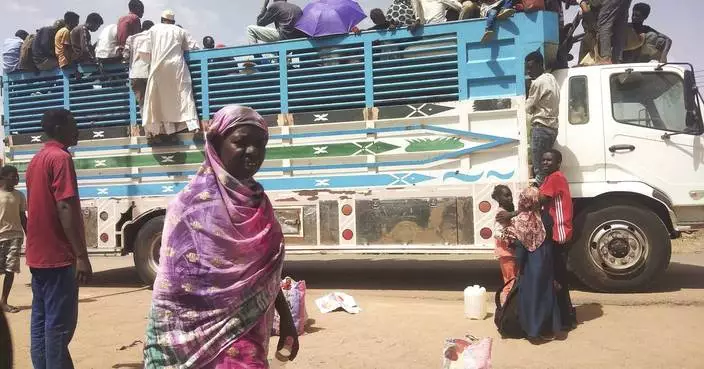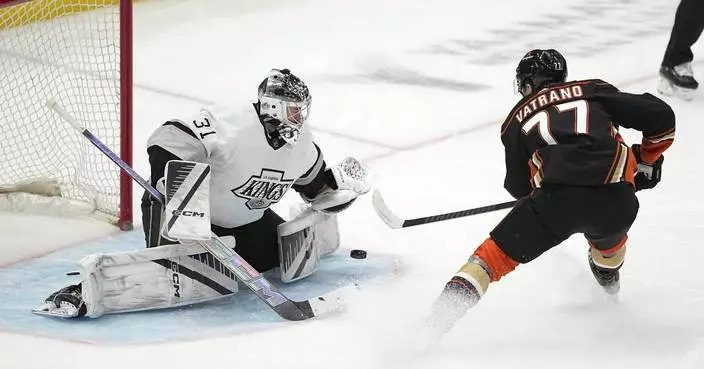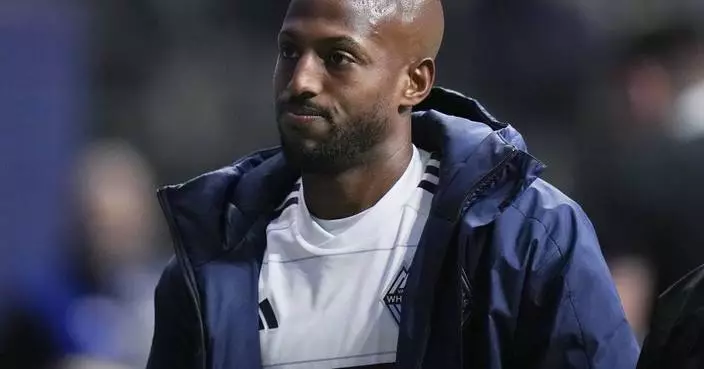President Nicolás Maduro launched extended military exercises along Venezuela's border with Colombia on Tuesday, drawing Washington's attention amid rising friction between the South American neighbors.
Maduro has come under mounting pressure from Colombia and the United States, which are among more than 50 nations that back opposition politician Juan Guaidó's bid to oust the socialist president. They contend Maduro's re-election in 2018 was bogus.
Tensions spiked recently when Colombia and Venezuela accused each other of harboring hostile armed groups within their borders that are trying to overthrow the neighboring government. In response, Maduro put soldiers on alert and summoned his defense council, saying the machinery of war has started against Venezuela.
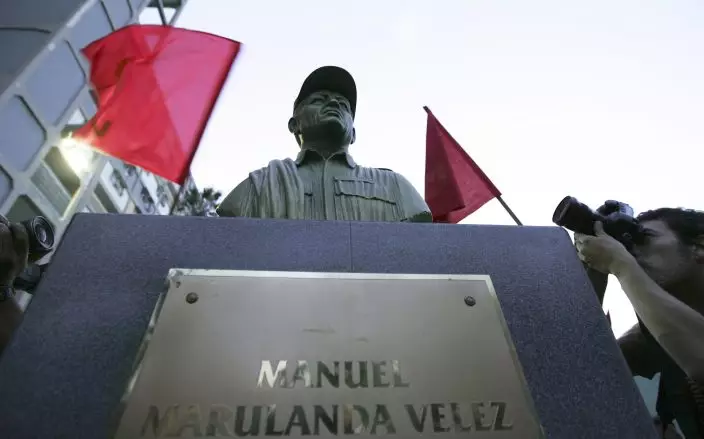
FILE - In this Sept. 26, 2008 file photo, photographers take pictures of a bust of the late Manuel Marulanda, the founding leader of the Revolutionary Armed Forces of Colombia, or FARC, unveiled by members of the Venezuela's Communist Party in a plaza in the Caracas' 23 de Enero neighborhood of Caracas, Venezuela. Colombian news magazine Semana reported on Sunday, Sept. 8, 2019 that leaked intelligence reports indicate Venezuelan President Nicolas Maduro’s socialist government is harboring Colombian rebels inside Venezuela, and Colombian officials say the information coincides with allegations they will present in Sept. 2019 to the U.N. (AP PhotoFernando Llano, File)
"The moment has come to defend our sovereignty and national peace by deploying our defense resources in full force," Maduro said on Twitter.
Roughly 150,000 military personnel will conduct drills through Sept. 28, said Remigio Ceballos, strategic commander of the Bolivarian National Armed Forces, who is overseeing operations.
An array of tanks, missile launchers and aircraft were staged at the Garcia de Hevia International Airport near the border. A military band played as the vehicles filed out.
"This is an operation to defend our national territory," said Ceballos, adding that the armed forces are on the watch to intercept attacks from Colombia, the U.S. or any other threat.
Officials in Washington on Tuesday expressed unwavering support for Colombia during this patch of rocky relations with Venezuela. The two countries have a shared history and their border stretches nearly 1,367-mile (2,200-kilometers).
Carlos Trujillo, the U.S. ambassador to the Organization of American States, said it was "totally unacceptable" that Maduro's "illegitimate government" has threatened the region's security and peace.
"Colombia's allies will do everything possible to help one of the best allies we've had — not only in the Americas but in the world," Trujillo added during a conference call with reporters.
The U.S. special envoy to Venezuela, Elliott Abrams, was even more direct.
"If there are cross-border attacks from Venezuela to Colombia, we can expect Colombians to react," Abrams said. "And obviously, we would fully support Colombia in that situation."
Colombian authorities estimate as many as 1,000 National Liberation Army rebels — or around 40% of that rebel group's fighting force — operate from Venezuela. The rebels there plan attacks like the January car bombing at a Bogota police academy that killed more than 20 mostly young cadets, Colombia says.
For its part, Venezuela's socialist government accuses Colombia's conservative president, Ivan Duque, of allowing training camps to operate inside Colombia for groups that plot violent attacks to undermine Maduro.
This is at least the fourth time so far this year that Maduro has ordered his troops deployed in exercises. In one, Maduro was shown on state TV acting as commander in chief, riding in tanks and jogging in formation with soldiers.
This display was seen as Maduro flexing his military muscle in response to Guaidó, who urged soldiers to abandon Maduro and join the opposition's movement to start fresh with new presidential elections.
Maduro has maintained support from the military, with the exception of several hundred troops. He's also backed internationally by allies such as Cuba, China and Russia.
Colombia's Duque has said Venezuela should spend its money on food, not missiles.
NCAA athletes will be immediately eligible to play no matter how many times they transfer — as long as they meet academic requirements — after the association fast-tracked legislation Wednesday to fall in line with a recent court order.
The NCAA announced the Division I Council's decision becomes official Thursday when its meeting adjourns. The change still needs to be ratified by the DI Board next week, but that is expected.
The new rules will go into effect immediately, though in reality they have already been enacted through a lawsuit filed late last year.
Transfer windows, which are sport-specific, remain in place and require undergraduate athletes to enter their names into the portal at certain times to be immediately eligible at a new school. Graduate students can already transfer multiple times and enter the portal outside the windows while maintaining immediate eligibility.
A coalition of state attorneys general late last year sued the NCAA, challenging rules that forced athletes that wanted to transfer multiple-times as undergraduates to sit out a season with their new school.
A judge in West Virginia granted the plaintiffs a temporary injunction, lifting requirements for multiple-time transfers to request a waiver from the NCAA to be immediately eligible to compete.
The NCAA quickly requested the injunction be kept in place throughout the remaining school year to clear up any ambiguity for athletes and schools. The association has had to issue guidance to its members to clarify what that means for next season. Now the rules match the court ruling.
By eliminating the so-called year-in-residence for transfers, an athlete must be academically eligible at the previous school and not subject to any disciplinary suspension or dismissal to compete immediately at a new school. Transferring athletes must also meet progress-toward-degree requirements before competing.
“We hope that this practical approach to transfer eligibility requirements will encourage student-athletes to make well-informed decisions about transferring and the impacts such a move could have on their ability to graduate on time in their degree of choice, particularly as it relates to transferable credits,” Florida deputy athletic director and council chairwoman Lynda Tealer said in a statement.
The board will ask the committee on academics to explore creating a new metric — similar to the NCAA's Academic Progress Rating — that would hold schools accountable for graduating the transfers they accept.
The portal windows are currently open for both football and basketball, and the lifting of restrictions on multiple-time transfers has led to an uptick in athletes looking to switch schools.
In a notable move that would not have been permissible without a waiver under previous rules, Alabama offensive tackle Kadyn Proctor entered the portal in January after Crimson Tide coach Nick Saban retired, committed to Iowa, but then changed his mind during the spring and has reentered the portal with the intention to reenroll at Alabama.
The DI Council also moved forward on legislation that would allow schools to be more actively involved in securing sponsorship deals for their athletes. Schools could still not directly pay athletes, but they could facilitate NIL opportunities between third parties and athletes.
AP Sports Writer John Raby in Charleston, West Virginia, contributed to this report.
Follow Ralph D. Russo at https://twitter.com/ralphDrussoAP and listen at http://www.appodcasts.com
AP college football: https://apnews.com/hub/college-football
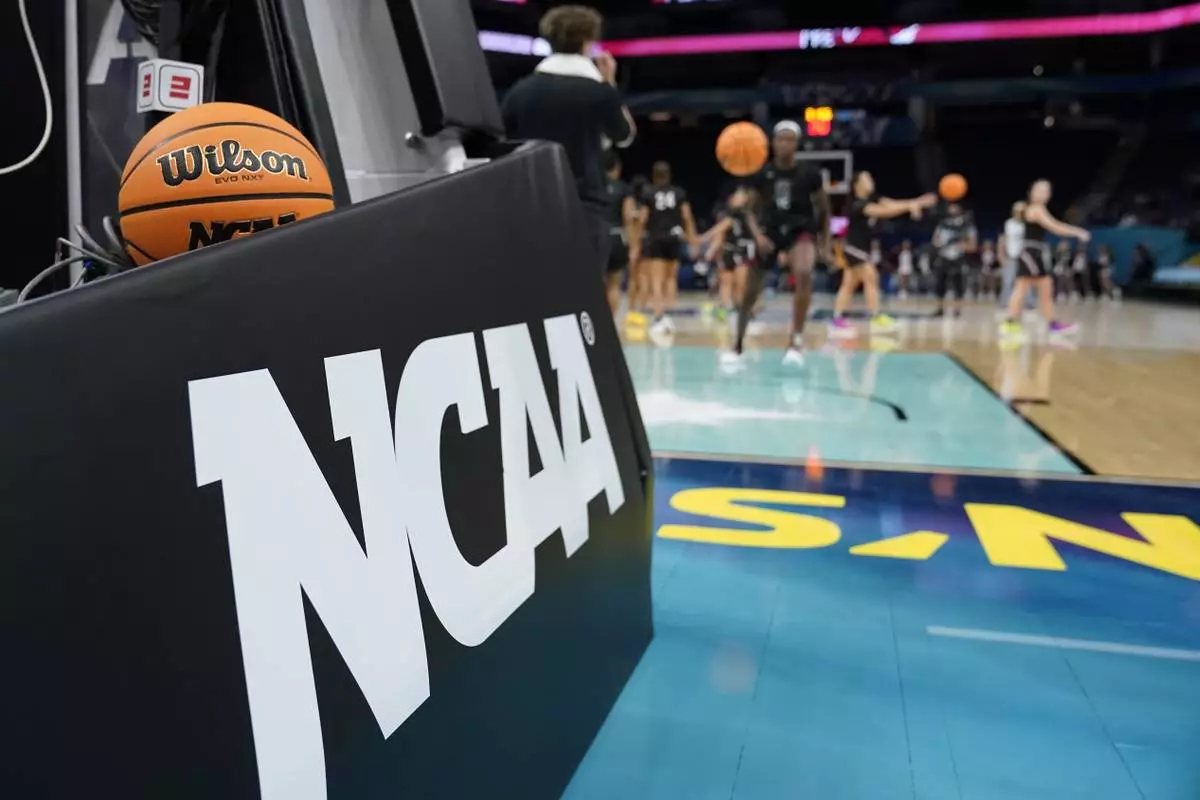
FILE - South Carolina players work out during a practice at the Women's Final Four NCAA college college basketball tournament, Saturday, April 2, 2022, in Minneapolis. NCAA athletes will be immediately eligible to play no matter how many times they transfer — as long as they meet academic requirements — after the association fast-tracked legislation Wednesday, April 17, 2024, to fall in line with a recent court order. (AP Photo/Eric Gay, File)
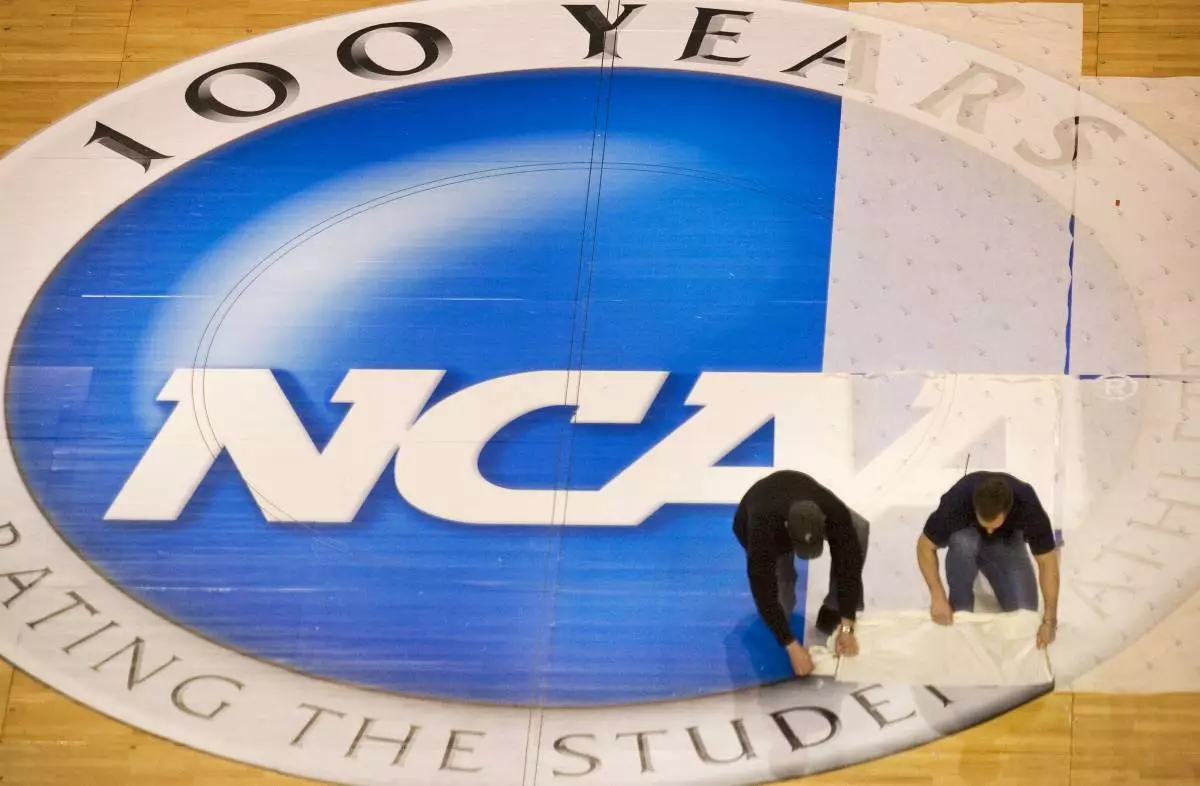
FILE - Wachovia Center operations manager Jim McDonald, left, and carpenter foreman Tim Allen remove the protective film covering the NCAA logo at mid-court on the center's basketball court, Wednesday, March 15, 2006, in Philadelphia. NCAA athletes will be immediately eligible to play no matter how many times they transfer — as long as they meet academic requirements — after the association fast-tracked legislation Wednesday, April 17, 2024, to fall in line with a recent court order. (Ed Hille/The Philadelphia Inquirer via AP, FIie)






